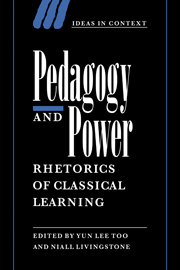Book contents
- Frontmatter
- Contents
- Notes on contributors
- Acknowledgements
- Introduction
- 1 Classics: from discipline in crisis to (multi-)cultural capital
- 2 Schoolboys and gentlemen: classical pedagogy and authority in the English public school
- 3 ‘Die Zung’ ist dieses Schwert': classical tongues and gendered curricula in German schooling to 1908
- 4 ‘What does that argue for us?’: the politics of teaching and political education in late eighteenth-century dialogues
- 5 Women and classical education in the early modern period
- 6 Pilgrimage to Parnassus: local intellectual traditions, humanist education and the cultural geography of sixteenth-century England
- 7 ‘Not so much praise as precept’: Erasmus, panegyric, and the Renaissance art of teaching princes
- 8 Teachers, pupils and imperial power in eleventh-century Byzantium
- 9 Reading power in Roman Greece: the paideia of Dio Chrysostom
- 10 Children, animals, slaves and grammar
- 11 A good man skilled in politics: Quintilian's political theory
- 12 The voice of Isocrates and the dissemination of cultural power
- 13 Xenophon's Cyropaedia: disfiguring the pedagogical state
- Select bibliography
- Index
- IDEAS IN CONTEXT
7 - ‘Not so much praise as precept’: Erasmus, panegyric, and the Renaissance art of teaching princes
Published online by Cambridge University Press: 30 September 2009
- Frontmatter
- Contents
- Notes on contributors
- Acknowledgements
- Introduction
- 1 Classics: from discipline in crisis to (multi-)cultural capital
- 2 Schoolboys and gentlemen: classical pedagogy and authority in the English public school
- 3 ‘Die Zung’ ist dieses Schwert': classical tongues and gendered curricula in German schooling to 1908
- 4 ‘What does that argue for us?’: the politics of teaching and political education in late eighteenth-century dialogues
- 5 Women and classical education in the early modern period
- 6 Pilgrimage to Parnassus: local intellectual traditions, humanist education and the cultural geography of sixteenth-century England
- 7 ‘Not so much praise as precept’: Erasmus, panegyric, and the Renaissance art of teaching princes
- 8 Teachers, pupils and imperial power in eleventh-century Byzantium
- 9 Reading power in Roman Greece: the paideia of Dio Chrysostom
- 10 Children, animals, slaves and grammar
- 11 A good man skilled in politics: Quintilian's political theory
- 12 The voice of Isocrates and the dissemination of cultural power
- 13 Xenophon's Cyropaedia: disfiguring the pedagogical state
- Select bibliography
- Index
- IDEAS IN CONTEXT
Summary
Erasmus was well acquainted with the arrogance of power; indeed, he could be accused of having abetted the powerful's illusions of grandeur. For example, in outlining his preferred Education of the Christian Prince, he freely declares that a country owes everything to its good prince. However, on Erasmus' calculation, this national debt of gratitude should be accounted to someone else's credit: for making the good prince what he is, the country is indebted to his educator. This is not just a Northern bout of Italian prepotenza; rather, it reflects the realisation or belief that, to use their power properly, rulers are dependent on the teaching of the learned. This realisation is what could be dubbed the pride of pedagogy. Erasmus was certainly not alone among Renaissance scholars in being blessed with the self-confidence that such a belief instils: those who devoted their lives to contemplation of the studia humanitatis often claimed that the education they promoted had a political importance. If they themselves could not combine, as it were, poetry and power, they could at least teach others how to negotiate the active life.
Teaching in the Renaissance was not only dignified, it was also lucrative. ‘Humanists’ might be definable as those members of scholarly coteries who formed the soi-disant intellectual avant-garde of fifteenth-century Italy and sixteenth-century Europe; but the term originates in umanista – a paid teacher of a defined curriculum of subjects. At the same time, the humanists could claim to be no ordinary schoolmasters.
- Type
- Chapter
- Information
- Pedagogy and PowerRhetorics of Classical Learning, pp. 148 - 169Publisher: Cambridge University PressPrint publication year: 1998
- 7
- Cited by

